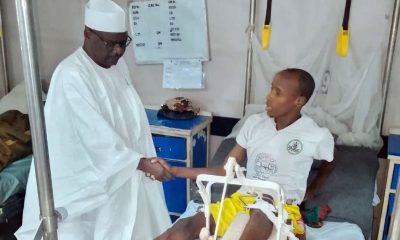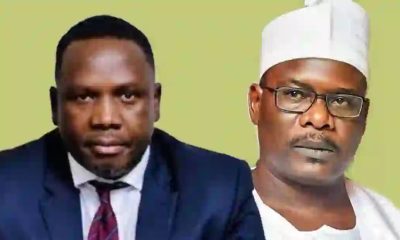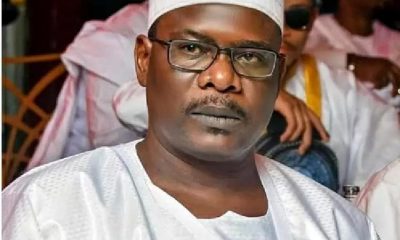“Lift the sanctions first, agree with them to start negotiating on when and how they are going to release the ousted President Bazoum, and then when they are going to hand over to civilians,” he advised.
News
Tinubu ill-advised on Niger Republic sanctions – Ndume
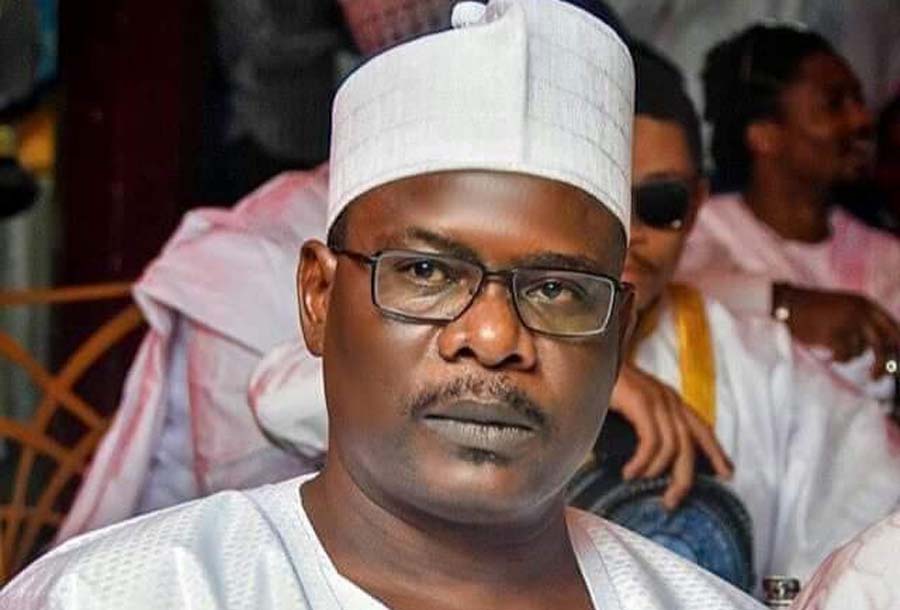
Tinubu ill-advised on Niger Republic sanctions – Ndume
The Senate Majority Chief Whip, Ali Ndume, has said that President Bola Tinubu was wrongly advised on ECOWAS sanctions on Niger military junta.
Mr Ndume, who represents Borno South in the Senate, said the sanctions were ineffective because they were only affecting innocent citizens.
Newstrends reports that the West African regional bloc imposed heavy sanctions on Niger following the ouster of President Mohammed Bazoum by the country’s military.
But speaking during an interview with journalists in Maiduguri, Mr Ndume said the sanctions were not affecting the military junta but innocent citizens.
“The sanctions are not affecting the military junta. The sanctions are affecting the poor people that are not part of the coup, and these are people, especially children, women, petty traders, and poor middle-income earners.
“Even the international law that guides us does not support sanctions that affect humanitarian needs. The suffering the people of Niger Republic are going through is more than imaginable.
The senator lemented that seven northern states who shared borders with Niger are also bearing the brunt of the sanctions.
He, therefore, appealed to Mr Tinubu, who is the ECOWAS chairman, to immediately lift the sanctions and address the crisis.
READ ALSO:
- Auto crash claims 9 on Christmas Day in Osun
- Army to take delivery of helicopters, others in 2024 – COAS
- Hoodlums attack Ebonyi church, kill three worshippers
“Because Nigeria is ECOWAS, and ECOWAS is Nigeria. Nigeria has the majority of votes and contributes 70 percent of ECOWAS funding.
“I am one of those against the actions taken by the ECOWAS leadership to impose sanctions on Niger. I strongly believe that that decision was rushed and it was not the right thing. I don’t support those sanctions because the decision affects me, my state and my region.
“Over 100,000 Nigerians, Borno State citizens from Abadam, Guzamala, Kukawa, and other places, all migrated to Niger, and they received them with open arms, not putting them in the camp, but taking them to their own houses; and they have been for more than 10 years now,” he said.
“Niger Republic has been supporting Nigeria. During the Biafran War, France, the colonial masters of Niger, supported the Biafrans, but the then Niger Republic President [Diori Hammani]refused to follow France in that decision. They gave us military support. Not only that, every time Nigeria stands for something, Niger stands with us.
Tinubu ill-advised on Niger Republic sanctions – Ndume
News
Just in: Factional Zamfara assembly leaders want governor to represent budget

Just in: Factional Zamfara assembly leaders want governor to represent budget
A factional House of Assembly has emerged in Zamfara state with members demanding the re-presentation of the 2025 Appropriation Bill by Governor Dauda Lawal.
The group, made up of nine lawmakers who were suspended in February 2024 over allegations of misconduct, conspiracy, and illegal sitting, convened in Gusau, the state capital, and declared the formation of a parallel legislative body.
At the session, the lawmakers elected Hon. Bashir Aliyu Gummi as Speaker of the factional assembly.
During the sitting, the faction addressed several issues, including the state’s deteriorating security situation, economic challenges, and the recent reports of mass sackings within the state civil service allegedly carried out by the Lawal administration.
READ ALSO:
- 2027: Atiku remains the best to face Tinubu, says Dele Momodu
- NLC to IMF: Your reforms inflict hunger, poverty on masses
- Nigerians deserve truth about electricity, not propaganda, labour slams power minister
The group further demanded that Governor Lawal re-present the 2025 budget, arguing that the process followed in its initial passage was flawed. The governor had originally submitted the N545 billion Appropriation Bill to the widely-known State House of Assembly led by Speaker Bilyaminu Ismail Moriki in December 2024. The bill was passed and signed into law that same month.
Present at Wednesday’s session were Hon. Aliyu Ango Kagara (Talata Mafara South), Ibrahim Tudu Tukur (Bakura), Nasiru Abdullahi Maru (Maru North), and Faruk Musa Dosara (Maradun 1). Others included Bashar Aliyu (Gummi 1), Bashir Abubakar Masama (Bukkuyum North), Amiru Ahmed (Tsafe West), Basiru Bello (Bungudu West), and Mukhtaru Nasiru (Kaura Namoda North).
Just in: Factional Zamfara assembly leaders want governor to represent budget
News
NLC to IMF: Your reforms inflict hunger, poverty on masses

NLC to IMF: Your reforms inflict hunger, poverty on masses
The Nigeria Labour Congress (NLC) has taken a swipe at the International Monetary Fund (IMF) over its policy proposals to Nigeria and other African nations on how to rejuvenate their ailing economies.
Indeed, the NLC pointedly told the IMF that its conditionalities for giving loans to Nigeria and others were inflict pains of hunger and poverty on the masses.
The NLC President, Joe Ajaero, stated this when he received the IMF team team comprising the its Resident Representative for Nigeria, Christian H. Ebeke, and, Axel Schimmelpfennig from Washington, DC.
The purpose of the visit, it was learnt, was to assess how Nigerian workers and the general populace are being affected by the current socioeconomic environment and the hardship resulting from government policies.
The IMF delegation, led by Schimmelpfennig also sought insights from the NLC regarding the state of the labour market in Nigeria. According to them, the information gathered would contribute to the IMF’s annual country report for Nigeria.
Sources at the meeting disclosed that the IMF team acknowledged that the Nigerian government has been grappling with fiscal challenges since assuming office.
They emphasized that the IMF’s recommendations are purely advisory and not mandatory, based on the prevailing realities in each country.
The delegation expressed concern that, often, governments do not follow the IMF’s recommendations to the letter, instead adapting them to align with political objectives. In effect, the IMF attempted to distance itself from the adverse consequences of some recent economic reforms in Nigeria.
READ ALSO:
- Nigerians deserve truth about electricity, not propaganda, labour slams power minister
- INEC may allow Nigerians without PVCs to vote in 2027
- Air Peace suspends flights over NIMET strike
Nevertheless, the IMF team requested continued engagement with the NLC going forward.
Ajaero made it clear that governance should prioritize citizens’ welfare over profit-making.
News
‘Enough is enough’, Tinubu directs security chiefs to stop violent attacks

‘Enough is enough’, Tinubu directs security chiefs to stop violent attacks
President Bola Tinubu has ordered security operatives to end forthwith the violent attacks in some parts of the country, especially in Plateau, Borno, and Benue states.
He gave the directive during a meeting with security chiefs at the State House on Wednesday.
The meeting was attended by Nuhu Ribadu, the national security adviser (NSA); Mohammed Mohammed, director-general of the National Intelligence Agency (NIA); Emmanuel Undianeye, chief of defence intelligence; Oluwatosin Ajayi, director-general (DG) of the Department of State Services (DSS); and Femi Gbajabiamila, chief of staff (CoS) to the President.
Speaking with journalists after the meeting, Ribadu said Tinubu declared that “enough is enough” on the resurgence of violence in some parts of the country.
The NSA said the president directed security chiefs to work with the political authorities in states and at the grassroots level to find a lasting solution to the insecurity.
He said the security chiefs had acted on Tinubu’s previous instructions by meeting with political leaders in the affected communities and states.
The NSA said the meeting offered the security chiefs the opportunity to fully brief the president about the current security situation of the country.
“This time, we were able to sit with him for hours and give a proper briefing. We also took new instructions from him,” he said.
“Insecurity is not only a government problem.
“It also involves the subnational units — the communities, local governments, and especially the governors. The president directed that we work more closely with them.
“Some of these problems are community-related. While not entirely so, that element plays a significant role.
“Mr. President is working hard to ensure that Nigeria enjoys peace and stability. We are not relenting. We will not stop until we get the results he demands.”
On the resurgence of violent attacks in Borno, Ribadu said the terrorists were planting explosives during the period of relative peace in the state.
“This enemy does not give up easily. When there’s peace for a long time, they try to shock the public with an isolated incident,” he said.
The NSA said the security situation in the country is not yet at 100 percent, while noting that there is “significant improvement”.
Since the beginning of the month, many have been killed in some communities in Plateau State.
Benue State has also recorded violent attacks as over 50 people were killed in Ukum and Logo LGAs on April 18.
-

 metro2 days ago
metro2 days agoRivers: Tinubu meets with Fubara, may lift his suspension
-
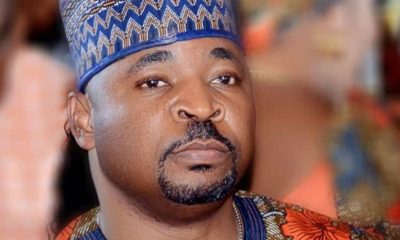
 metro2 days ago
metro2 days agoBring your children to compete with mine, MC Oluomo challenges those mocking his spoken English
-

 metro1 day ago
metro1 day agoI’m not in supremacy battle with Ooni, says new Alaafin
-

 News3 days ago
News3 days agoTinubu returns to Nigeria after France, UK trip
-

 metro3 days ago
metro3 days agoAnsar-Ud-Deen Society of Nigeria elects new leaders, Tinubu praises educational contributions
-

 Business2 days ago
Business2 days agoMarketers count losses as NNPC slashes petrol price
-

 metro3 days ago
metro3 days agoReno Omokri defends Tinubu’s appointments, blasts president’s critics
-

 metro3 days ago
metro3 days agoN10m raised to relocate boy who faced Peter Obi convoy — Lawyer

